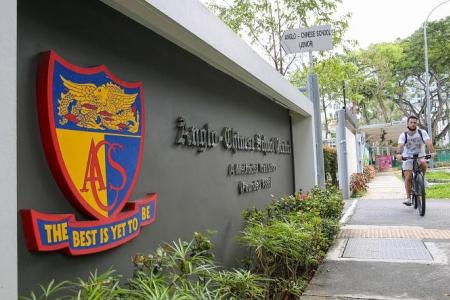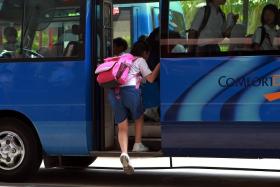ACS is not an exclusive school and would open more schools if it could, says board chairman
Anglo-Chinese School (ACS) is not an exclusive school, said Mr Richard Seow, chairman of its board of governors, on Thursday.
“If you allow us, we’d open more schools,” he said, adding that ACS hopes to draw in more students of greater diversity beyond those that live within its vicinity.
His remarks at a separate press conference held at ACS (Primary) came after the Ministry of Education’s announcement that the primary school at the Barker Road campus will relocate to Tengah in 2030.
From 2039, ACS Junior students will move into the current ACS Primary Barker Road premises, which are owned by the Methodist Church.
“We’re not going to move from Barker Road. We have our home in Barker Road. We want to move into other locations,” said Mr Seow.
Most reactions from the alumni community so far have been positive, he said, although there have been some concerns from a minority about the distance to Tengah and becoming co-ed.
But these are mainly “knee-jerk” reactions, said Mr Seow, as parents realise that existing ACS students will not be affected by the move, and the relocated school will only be taking in new Primary 1 pupils from 2030. This will apply to children born in 2023 and beyond.
He acknowledged that some people might have initial reservations about the school taking in girls. “People in my generation are very used to being from a boys’ school. But I think if you look to the younger generation... why not?”
“Everyone hesitates because they don’t like change. And I think people’s reaction (at the) outset may be negative, but once they look at the rationale and once they look at the benefits, I think everyone will be happy,” he said, adding that there are plans for townhall sessions to be held with parents, alumni and other stakeholders.
Mr Lock Wai Han, president of the ACS Old Boys’ Association, said: “If you look at the broader picture, you’ll see that the number of classes in the new school has actually increased and will now allow daughters of alumni to come in. So overall, I think alumni will benefit tremendously from having both their sons and daughters to be able to get into ACS.”
Mr Seow, who has been chairman of the ACS board since 2008, hopes that the school will in time become an anchor institution in Tengah. “ACS is an old school in Singapore. A lot of people know ACS and we want to basically share ACS with many different communities. And so we thought the fact that we could go into Tengah was one of the best opportunities we had,” he said.
Meanwhile, the new special education (Sped) school that will be sited with the relocated ACS Primary in Tengah has been about a decade in the making, said Mr Seow.
“This has been a longstanding conversation that we’ve had with MOE... we’d probably have one of the largest cohorts of special needs kids in mainstream schools,” he said. “So we wanted to invest and we wanted to go and pursue these areas... Now that MOE has invited us to do it, we are ecstatic.”
He hopes to see joint programmes like co-curricular activities between both schools.
“You don’t want to put them in separate enclaves. And so people need to work together and understand the difficulties, the insecurities, and I think it’s good for people to interact,” he said.
Get The New Paper on your phone with the free TNP app. Download from the Apple App Store or Google Play Store now


